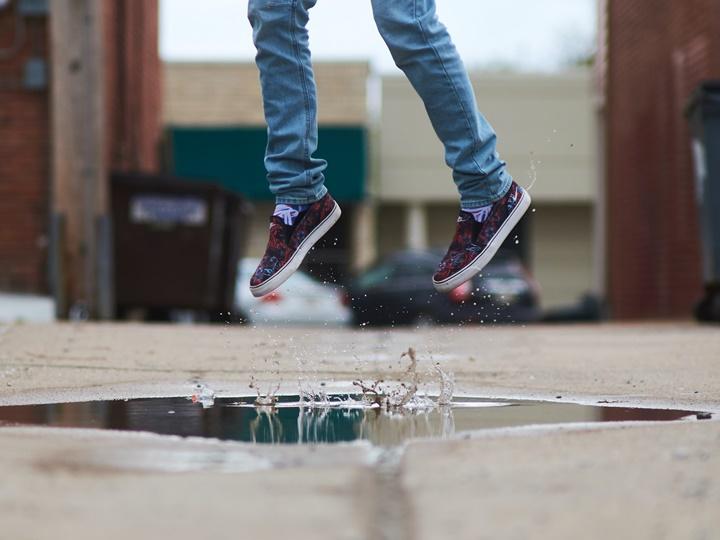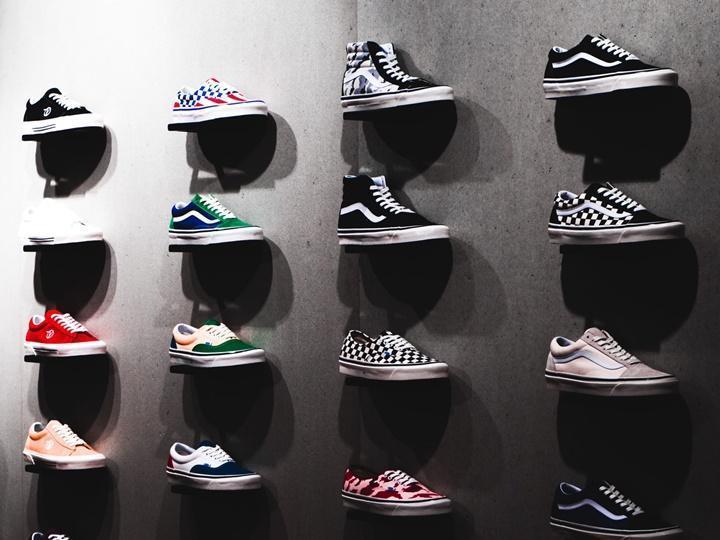Vans sneakers are non-slip or slip-resistant, for daily use. (so yes, they are slip resistant.) The outsoles of their shoes are made from vulcanized rubber, providing great traction on any surface. Are Vans non-slip certified in working environments? No. A certified slip-resistant shoe is required in working environments like restaurants, cleaning, etc.

You might have begun working at McDonald’s, assisted in a restaurant, cleaned homes, interned at a hospital, or worked as a roofer. What do all of these jobs have in common, exactly? You must put on slip-resistant footwear for all of them. Why? Because you move more quickly when it’s busy (the ground may be wet or slick), wearing the wrong shoes may be a mistake for which you’ll later pay if you slip.
If you’re a skater or someone who loves daredevil antics, you already own a pair or two of sneakers from Vans. Vans has earned a reputation as the go-to footwear for most skateboarders because their sneakers are made for rugged and tough terrains.
This gives skateboarders the confidence to try and execute more complex tricks and maneuvers because they know they won’t accidentally slide or slip. But do Vans have slip-resistant shoes which make them suitable for various settings?
Related: Best Insoles for Vans, How to Tell if Shoes are Slip Resistant, How to Avoid Slipping on Ice When Walking
Can I wear my Vans to work?
Whether you work in a restaurant where floor surfaces tend to be slippery or in a barbershop or salon where hairs are accumulated on the ground, you’ll be assured that you won’t accidentally slip because Vans feature slip-resistant outsoles to keep you protected all day as you move during long hours at work. However, when iso certified 20347 shoes are required to do your job, then it won’t be allowed to use vans (eg. when working in Mcdonald’s)
Since Vans sneakers are rubberized, they are far more slip-resistant than other sneakers. You have a very low chance of slipping on wet or greasy floors because Vans uses only high-quality materials, unlike other brands.
Vans also come in different colorways and patterns, so you have many options to choose from to make them fit your work environment. Black Vans sneakers are especially popular in the service industry because they don’t demand attention and won’t raise eyebrows.
How do you know your shoe is non-slip or slip-resistant?
Aside from the label telling you that the shoes are slip-resistant or non-slip, it is always best to inspect the depth of the treads and the tread patterns of your shoe to know if it’s the real deal. Vans’ waffle patterns are famous for having a soft outsole and deep tread patterns.
These allow the sneakers to grab onto any surface and provide a great grip as you work at the cafe or the shop. They also prevent you from falling while walking on slippery surfaces where water or grease may be present.
A dead giveaway that confirms that Vans sneakers are non-slip is that most skateboarders put their bodies on the line as they perform high-risk maneuvers. All these while wearing Vans!
What makes a pair of shoe non-slip?
According to regulations the outsole of a shoe is more likely to be slip-resistant when the material and the design are made to be non-slip:
- Work with rubber materials, or Polyurethanes that stick to the floor
- Design the treads of the outsole with sharp edges, avoid rounded edges
- Design the base pattern of the outsole in a way that fluids are easily pushed away
Are Vans non slip in a certified way following the above design instructions? No, but the tread patterns of your sneakers are usually the primary determinant of the slip resistance it provides. Almost all shoes you can buy on the market have tread patterns but aren’t as reliable as others. We thus recommend performance footwear like Vans which has tons of them. Wearing quality non-slip footwear gives you the best chance of handling every environment or surface you will be working in.
Once you have selected a non-slip sneaker that you like, remember that it doesn’t necessarily mean you are immune to accidents. Wearing non-slip shoes simply makes them less likely to happen.
What makes Vans sneakers better than other shoes?
Vans utilize a unique vulcanization process to make their shoes as durable as possible. The rubbers used to form the soles of the sneakers are baked during the early stages in a five-step production process.
Making durable and slip-resistant Vans footwear starts with curing high-quality rubber in high temperatures before being compressed. The shoe soles are then hole-punched out of this compressed rubber. They are then pressed into the signature criss-cross-shaped waffle sole we all know and love.
As they move into the assembly room, the uppers and the finer details of the shoe are applied. This is where the sneakers form their signature shape. The last step involves heating the sneakers in a vulcanizing oven that hardens the footwear to complete its construction.
Some sneakers you can buy online are made from synthetic materials like EVA foam or lightweight nylon. They can’t withstand the manufacturing process Vans utilizes for their sneakers as these tend to melt in high temperatures. Are vans non slip compared to lightweight runners? yes, for sure!
The uppers for Vans shoes are made with fabrics like canvas and suede due to this fact. These materials withstand high heat and are also perfect for repelling liquid and dirt which are especially important when your job involves a lot of heavy-duty activities.
What shoes are non-slip?
There are 4 big names in the non-slip shoe category that are popular for people working in the service industry. Namely, they are Skechers, Vans, Converse, and Crocs.
These 4 arguably have the best slip-resistant shoes you can buy right now; all three are known for their comfort, reliability, and durability. You’ll find them in almost any working environment. You may even see all 3 of them in the feet of your colleagues.
These 4 reliable shoe manufacturers have different pros and cons and have varying price points. If you’re unsure which footwear to buy for your day-to-day activity, it’s important to research what you need and stay within your budget.
What can I use in place of non-slip shoes?
Some people may find the price of non-slip shoes expensive and out of reach, forcing them to compromise on safety. We have great news for you if you are one of those people. Some options help you improve the resistance of the shoe you have now.
Consider buying attachable soles as they are cheap. They protect your shoes’ original outsoles from wear and may even extend their lifespan.
There are also slip-resistant spray-on coatings being sold but make sure you choose the ones that are compatible with your pair of shoes. If these 2 aren’t options that are available to you, a quick solution is spraying liberal amounts of hairspray on the outsoles and letting it dry before wearing your pair. This isn’t a permanent fix, so just be wary of that.

